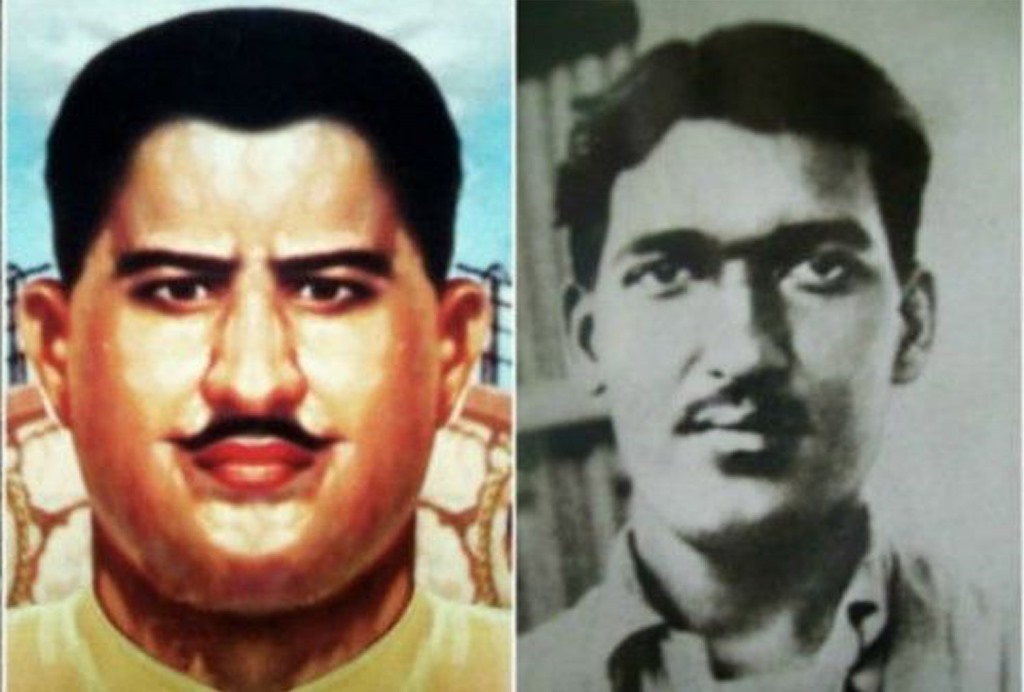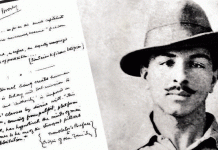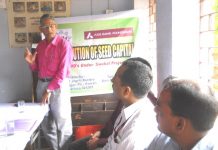Ram Prasad ‘Bismil’ and Ashfaqullah Khan were two legendary freedom fighters of great courage and conviction who were hanged to death by colonial rulers for their alleged role in Kakori case in December 1927.
Both of them shared important similarities. They were both men of extraordinary courage and determination who sacrificed their all at a young age. They both had very large-hearted concerns which went beyond narrow nationalism and they shared the vision of an alternative world based on justice and equality. They and their families had close connections to Shahjahanpur area of Uttar Pradesh (then United Provinces). They shared a common passion for poetry and were good poets themselves.
On the basis of their shared concerns as well as deep affection for each other they became such close friends that their friendship became a legend in their lifetime. This also became a strong symbol and an inspiration for communal harmony.
Ashfaqullah Khan had a natural inclination for rising above any sectarian thinking. His thinking was based on welfare of all people and could not be constrained by any narrow religious identity. Ramprasad was initially influenced by some narrow views. However he soon rose above all narrow thinking on the basis of his study of world-level change and revolution. Hence he soon overcame narrow influence and started thinking in terms of justice and equality at world level.
So initially when Ashfaqullah tried to befriend Ram Prasad, his senior, Prasad was not very enthusiastic. But later he realised the many great qualities of Ashfaq and also overcoming his initial prejudice, he embraced Ashfaq wholeheartedly. As member of a revolutionary group, they participated together in many dangerous exploits and assignments. The leadership role was more with Ram Prasad, but Ashfaq played a very courageous role and Ram Prasad realized as a leader that Ashfaq was one colleague who could always be trusted.
Ram Prasad has written that he soon started regarding Ashfaq as his younger brother. This pleased Ashfaq, but he also yearned to be an equal colleague. This desire too was soon fulfilled as the two started going together on risky ventures as members of a revolutionary party.
There is a popular story about their close friendship. Once Ashfaq fell seriously ill and in his high fever he again and again called out ‘Ram’ ‘Ram’. Some of his elder family members felt that he had fallen too much under the influence of Hindu religion and were upset. Then a friend arrived and cleared the mystery. Then Ram Prasad was called and when he sat by the side of Ashfaq and talked to him most affectionately, family members understood that Ashfaq was calling out only for this Ram. This timely arrival also helped in the recovery of Ashfaq.
Some of Ram Prasad’s Hindu colleagues were upset that he was placing too great a trust in a ‘Muslim’, but in his leadership role Ram Prasad never wavered in his deep trust of Ashfaq and Ashfaq fully honoured this trust placed in him. Till the last time, Ashfaq continued to be a devout Muslim and tried his best to bring in more members of his community to the path of freedom movement.
Ashfaq popularised Hindi in his own community, but at the same time asked Ram Prasad to also write in Urdu so that his community members can also read his revolutionary writings.
When death sentence was announced for both of them (and two others Rajendra Lahri and Thakur Roshan Singh) in the Kakori case, it was widely seen as most unjust as there were no grounds for a death sentence. It was only a dacoity case but one stray fire had resulted in the accidental death of one person. It was not known who exactly had fired this shot. Certainly the four freedom fighters who were sentenced to death had not fired this stray shot, although some other members of their group may have done so. In particular it was known that Ram Prasad Bismil had given strict orders for not killing any innocent person.
Hence there was a strong legal case for reconsideration of the death sentence and so pleas for this were sent to authorities in India and Britain. However Ashfaq had such a strong sense of the injustices of the colonial system that he opposed this. He initially said that if he has to pray, he will say his prayers only to ‘Khuda’ and not to anyone else. Later he agreed only when Ram Prasad argued that in order to expose how unjust the system is, all legal possibilities should be explored.
Although they were initially imprisoned separately, fate had ordained that the two great friends will meet once again before death. So the judicial process brought them face to face once again in death sentence cells (Phansi Kothri) in Lucknow Jail. Here the two great friends met for the last time and shared some of their innermost feelings and thoughts with each other.
Around this time Ram Prasad issued a statement that if at all highly unjust death sentence is to be given, this should be only for him as he was the leader of the dacoity as well as of the group of revolutionaries, and the death sentence should be taken back in the case of three other accused.
The legendary friendship of two great freedom fighters Ashfaqullah Khan and Ram Prasad ‘Bismil’ will always remain a powerful symbol and inspiration for communal harmony in India.
Bharat Dogra is a freelance journalist who has been involved with several social movements.













